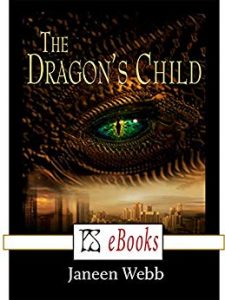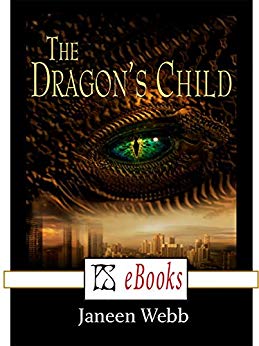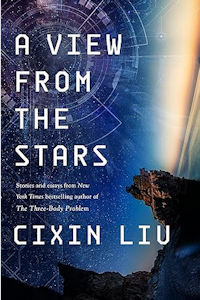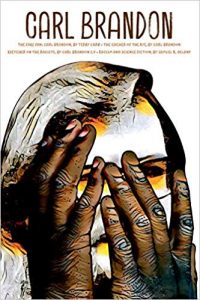Ian Mond Reviews The Dragon’s Child by Janeen Webb
 The Dragon’s Child, Janeen Webb (PS Publishing 978-1-786363-19-0, £15.00, 208pp, hc) May 2018.
The Dragon’s Child, Janeen Webb (PS Publishing 978-1-786363-19-0, £15.00, 208pp, hc) May 2018.
Janeen Webb’s novella The Dragon’s Child opens with Lady Feng, a wealthy Hong Kong businesswoman, deciding to “stretch her claws” on the first day of Chinese New Year (The Year of the Dragon). Assuming her true dragon form, Lady Feng circles a remote village where she spies a tasty morsel of meat. It’s only after she gobbles down the delicious mouthful, as she hears the screams of terror from the villagers below, that Lady Feng realises she’s just eaten a newborn baby. Ever one to be fair and just (and to assuage her guilt), she compensates the bereaved family with a child of her own, the smallest of four fertilised eggs.
When the dragon hatches, it immediately imprints on its new mother, Mai-Lin. Not heeding the warnings from the village priest – “a cuckoo chick always takes over the nest. It will rule your lives” – Mai Lin falls in love with her replacement child and names him Long Wei – Iron Dragon. If you’re thinking at this point the novella will be a traditional coming of age/fish out of water story as Long Wei struggles but eventually comes to terms with what it means to be human, then you would be wrong. Long Wei isn’t interested in assimilation; rather, like all of his kind, Long Wei is obsessed with discovering and hoarding treasure. If he has an aim, beyond greed and power, it’s to confront his biological mother and have her justify why she left him with a village of weak-minded humans.
It’s truly astonishing how much plot Webb packs into The Dragon’s Child without the story ever feeling rushed or thinly drawn. The narrative effortlessly shifts between Lady Feng’s machinations to expand her and Lord Jade’s empire in Hong Kong and Long Wei’s less than successful schooling. Wei’s very human anger, his rebellious nature, is beautifully juxtaposed against his mother’s measured, pragmatic, and cold attitude. While Wei’s father, Lord Jade, views the young dragon as a poor investment, Lady Feng sees the opportunities of harnessing a son who “understands humans better than any dragon ever has.” And while it’s hard to like Wei – all arrogance and ego – you can sympathise with him, understand why he might hate the mother who abandoned him. All of this, the intricate dynamics of dragon-culture, is wonderfully handled by Webb, made all the more satisfying by an ending that isn’t tidy or neat but remains true to the characters.
This review and more like it in the September 2018 issue of Locus.
 While you are here, please take a moment to support Locus with a one-time or recurring donation. We rely on reader donations to keep the magazine and site going, and would like to keep the site paywall free, but WE NEED YOUR FINANCIAL SUPPORT to continue quality coverage of the science fiction and fantasy field.
While you are here, please take a moment to support Locus with a one-time or recurring donation. We rely on reader donations to keep the magazine and site going, and would like to keep the site paywall free, but WE NEED YOUR FINANCIAL SUPPORT to continue quality coverage of the science fiction and fantasy field.







